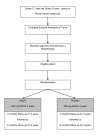The utility of Aspirin in Dukes C and High Risk Dukes B Colorectal cancer--the ASCOLT study: study protocol for a randomized controlled trial
- PMID: 22168568
- PMCID: PMC3271983
- DOI: 10.1186/1745-6215-12-261
The utility of Aspirin in Dukes C and High Risk Dukes B Colorectal cancer--the ASCOLT study: study protocol for a randomized controlled trial
Abstract
Background: High quality evidence indicates that aspirin is effective in reducing colorectal polyps; and numerous epidemiological studies point towards an ability to prevent colorectal cancer. However the role of Aspirin as an adjuvant agent in patients with established cancers remains to be defined. Recently a nested case-control study within the Nurses Health cohort suggested that the initiation of Aspirin after the diagnosis of colon cancer reduced overall colorectal cancer specific mortality. Although this data is supportive of Aspirin's biological activity in this disease and possible role in adjuvant therapy, it needs to be confirmed in a randomized prospective trial.
Methods/design: We hypothesize through this randomized, placebo-controlled adjuvant study, that Aspirin in patients with dukes C or high risk dukes B colorectal cancer (ASCOLT) can improve survival in this patient population over placebo control. The primary endpoint of this study is Disease Free Survival and the secondary Endpoint is 5 yr Overall Survival. This study will randomize eligible patients with Dukes C or high risk Dukes B colorectal cancer, after completion of surgery and standard adjuvant chemotherapy (+/- radiation therapy for rectal cancer patients) to 200 mg Aspirin or Placebo for 3 years. Stratification factors include study centre, rectal or colon cancer stage, and type of adjuvant chemotherapy (exposed/not exposed to oxaliplatin). After randomization, patient will be followed up with 3 monthly assessments whilst on study drug and for a total of 5 years. Patients with active peptic ulcer disease, bleeding diathesis or on treatment with aspirin or anti-platelet agents will be excluded from the study.
Discussion: This study aims to evaluate Aspirin's role as an adjuvant treatment in colorectal cancer. If indeed found to be beneficial, because aspirin is cheap, accessible and easy to administer, it will positively impact the lives of many individuals in Asia and globally.
Trials registration: Clinicaltrials.gov: NCT00565708.
References
-
- GLOBOCAN. American Cancer Society; 2000. Cancer Incidence, Mortality, and Prevalence Worldwide.
-
- Singapore Cancer Registry Interim Report: Trends in Cancer Incidence in Singapore 2002-2006. National Registry of Disease Office (NRDO)
-
- Boyle P, Levin B. WHO 2008 World cancer Report. International Agency for Research on Cancer. Nonserial Publication, WHO Press. 2008.
Publication types
MeSH terms
Substances
Associated data
LinkOut - more resources
Full Text Sources
Medical


